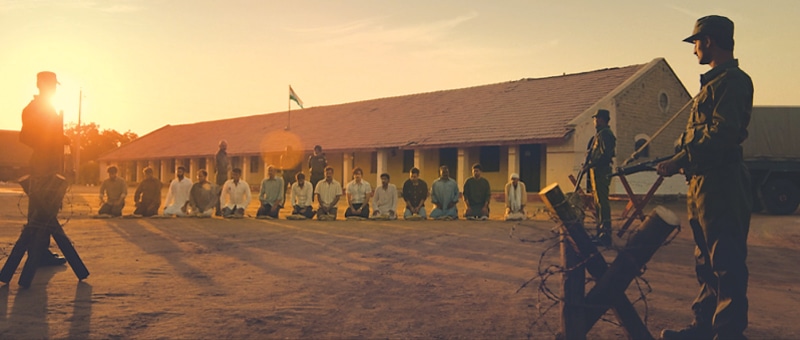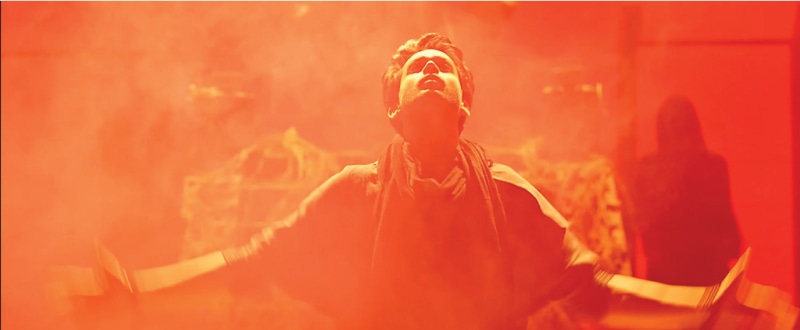
At the end of their uber-dramatic performance of the theatre play Khel Khel Mein (KKM) — also the title of this new Pakistani film playing now in cinemas — the governing board of the prestigious and expensive university, IMS, toss an advice more juvenile than the burning ambitions of the youngsters on stage: “History is for the history books,” they scold, “and it definitely has no place in an international cultural exchange theatre competition.”
The thing is, I think the people of the board do not watch movies, otherwise they would have been ready for the fiery factual thrashing from the film’s leading lady (Sajal Aly).
“Fall of Dhaka [which the film and the play is about] has one measly paragraph in college textbooks, but Mughal emperors and their horses get pages,” she spits in retort.
Evidently, someone made a very intentional historical boo-boo in the curriculum.
Nabeel and Fizza’s Khel Khel Mein talks a good game and brings a strong as-yet-untold sentiment to the forefront — but its filmmaking and narrative are rushed and it lacks real conviction
Although the omission of history from our collective memory forms one of the principal arguments in KKM, this is but one of the many boo-boos we see in the film. Some of them our fault, the other of the filmmakers.
Frothing with unappeasable drive, Nabeel Qureshi and Fizza Ali Meerza’s undertaking is a sensationalist, morale-rousing, history-recalling, conscious call that’s also, for better or worse, a feature film.
Zara (Sajal) is an almost invisible, sometimes meek, young woman who is dogged by the horrors of Pakistan and Bangladesh’s separation in 1971. While most of her family has moved on, she doesn’t want to let go. Eventually, she teams up with no-good, good-hearted bullies led by Saad (Bilal Abbas Khan) — the son of the institution’s antiquated-minded benefactor (Javed Sheikh; wasted).

Saad is failing college and — surprise, surprise — wants to be an actor. He even asks career advice from the cameoing Ali Zafar.
“You have to fight for it,” Zafar says before abruptly disappearing from the film (all well-known actors in the film tend to do that). It’s an advice that Saad may have taken to heart, because fight he shall… if not always from the frontlines (that’s Zara’s domain).
Saad is the President of IMS’s Dramatic Society, which their principal (Marina Khan; more wasted) and the governing board want to shut down…desperately. However, he and his cohorts find a sneaky way to save their passion for the arts by enlisting in an international competition in Bangladesh.
The participants include jilted Bangladeshis and Indian villains headed by Naveed Raza — a guy who has obviously flunked way too many times in his university.
The competition is the entire latter-half of KKM, but to get there some minor obstacles need taking care of, such as getting right passing grades, receiving approval for the incendiary play they want to stage, and undertaking a preachy segue about home-grown terrorism.
KKM’s pre-intermission segment feels rushed, both screenplay-wise and editorially. Scenes run on top of each other with little breathing room; it’s almost as if Nabeel and Fizza wanted that end of the story out of the way ASAP.
Nabeel and Fizza’s films have always been a victim of second-act problems.
A play or a film often have three acts — a beginning, where the characters are established; a middle, where the gist of the story is unveiled; and the end, with the climax.
Often dealing out just pre- and post-intermission halves — an outmoded way of writing films from the 1980s to the 2000s — their works mostly build up the story and then slide straight to a hasty conclusion.
Second acts are probably the most important — and definitely the most difficult — to fabricate. Without one, the story suffers.
Nevertheless, KKM has one of the best post-intermission storytelling from the filmmakers. It’s harrowing and dramatic, with brilliantly acted segments featuring Manzar Shebai (who just made a fan out of me) and Sheheryar Munawar Siddiqui (a bit stocky, in 1970s hairdo and clothes). Their scenes force tear ducts to well up.
The rest of the film makes you wonder, both in good and bad ways, by bringing a mix of emotions to the table.
KKM’s pre-intermission segment feels rushed, both screenplay-wise and editorially. Scenes run on top of each other with little breathing room; it’s almost as if Nabeel and Fizza wanted that end of the story out of the way ASAP.

Characters’ intentions and the obstacles they have to overcome are introduced early but are quickly forgotten, making the motives feel trifling and the people one-dimensional. Most situations often end in flared-up, galvanising telling-offs from Zara.
Why is she so agitated? She just is, one is led to assume, because the ground-work is missing. Yes, we are told the reason but we don’t really empathise because there are no scenes that show us her side of the emotion, other than her monologues (to that end, the monologues don’t work).
Minor Spoiler Alert! When she does find the answers — which lead to more questions on the audiences’ part — we learn that her personal dogged resolve doesn’t lead to the “actual” resolve on the story’s part. In fact, the last minutes of the climax all but forget to add a conclusion and a closure to the main plot of KKM (Major Spoiler Alert! — Zara searches for, and finds, a long-lost relative in Bangladesh, only to do nothing about his inhuman predicament).
Now, given the tricky relationship Pakistan has with Bangladesh, one doesn’t expect a miraculous, quick-fix solution. Actually, given the story, the conclusion doesn’t have to be a solution at all; it just had to be something other than the presentation of a statement and a message.
Perhaps it needed a small scene of unified awareness between the young and the powers-that-be, which would give hope of ushering changes in the long run?
At this point, I was reminded of Rang De Basanti (RDB) — a reference some reviewers would be eager to jump on to for obvious reasons, which I don’t concur with (having a message-laden story and telling it via carefree youths who develop awareness isn’t a rip-off in my opinion).
Like RDB, KKM talks a good game, brings a strong, as-yet-untold sentiment to the forefront — but like the “supposedly classic” Bollywood film, it lacks conviction. It doesn’t matter if the film adds parallel flashbacks of martyrdom (in KKM’s case: real atrocities), or have characters flare up in monologues that announce problems with actors bulging the eyes out of their sockets in indignation (Sajal is a master of this art).
I, however, liked KKM better than RDB.
Nabeel is inching towards greatness with each film (a segment of a pre-partition 1971 massacre, shot entirely from a child’s point-of-view, is nothing short of brilliant). He has better control of his actors and their performances — Bilal and Sajal light up the big screen; they have the aura of film stars, and they’re good actors to boot.
The supporting cast, which includes Mojiz Hasan (Parchi, Heer Maan Jaa) and a bunch of newbies, is likable. The songs by Shani Arshad, Shuja Hyder and Asrar Shah are engaging and playlist-worthy. Rana Kamran, their go-to cinematographer, shoots well enough.
If only the film wasn’t rushed — filmmaking and narrative-wise — I’m (almost) certain it would have worked out its kinks, and then be hailed for its greatness.
In its current form, the film is good. Given its timeliness (this is the 50th year of the separation between the two countries), maybe even quite good.
Released by Eveready Films, Khel Khel Mein is now playing in cinema screens across Pakistan
Published in Dawn, ICON, November 21st, 2021















































Dear visitor, the comments section is undergoing an overhaul and will return soon.